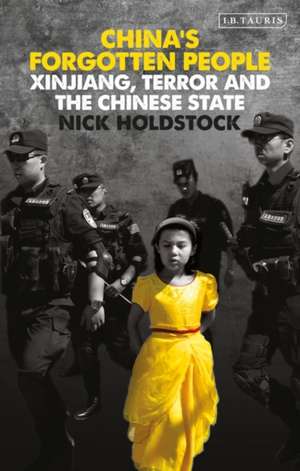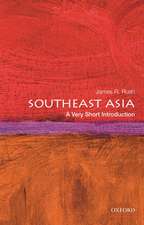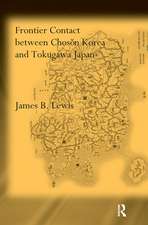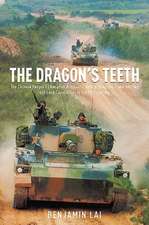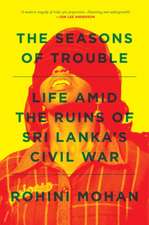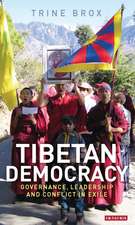China's Forgotten People: Xinjiang, Terror and the Chinese State
Autor Nick Holdstocken Limba Engleză Paperback – 12 iun 2019
| Toate formatele și edițiile | Preț | Express |
|---|---|---|
| Paperback (2) | 146.36 lei 22-36 zile | |
| Bloomsbury Publishing – 11 mai 2015 | 146.36 lei 22-36 zile | |
| Bloomsbury Publishing – 12 iun 2019 | 148.58 lei 43-57 zile |
Preț: 148.58 lei
Preț vechi: 160.24 lei
-7% Nou
Puncte Express: 223
Preț estimativ în valută:
28.44€ • 30.90$ • 23.90£
28.44€ • 30.90$ • 23.90£
Carte tipărită la comandă
Livrare economică 21 aprilie-05 mai
Preluare comenzi: 021 569.72.76
Specificații
ISBN-13: 9781788319799
ISBN-10: 1788319796
Pagini: 320
Dimensiuni: 138 x 216 x 19 mm
Greutate: 0.43 kg
Editura: Bloomsbury Publishing
Colecția I.B.Tauris
Locul publicării:London, United Kingdom
ISBN-10: 1788319796
Pagini: 320
Dimensiuni: 138 x 216 x 19 mm
Greutate: 0.43 kg
Editura: Bloomsbury Publishing
Colecția I.B.Tauris
Locul publicării:London, United Kingdom
Caracteristici
The
first
book
on
the
Xinjiang
region
and
the
extraordinary
network
of
concentration
camps
recently
revealed
to
be
holding
nearly
a
million
Muslims
Notă biografică
Nick
Holdstock
is
an
award-winning
writer
of
fiction
and
journalism
whose
work
appears
inThe
Guardian,
The
Times
Literary
Supplement,the
London
Review
of
Books,
Financial
Times,n+1,DissentandLiterary
Review.
He
is
the
author
of
three
non-fiction
books
about
China,The
Tree
That
Bleeds(Luath,
2011),
China's
Forgotten
People(IB
Tauris,
2015)
andChasing
the
Chinese
Dream(IB
Tauris,
2017)
and
a
novel,The
Casualties(St
Martins,
2015).
His
first
short
story
collection,The
False
River,
is
due
out
in
late
2019.
He
is
a
frequent
commentator
on
China
for
a
variety
of
media
outlets.
Cuprins
Maps
A Note of Place Names
Foreword to the New Edition: The Camps and the Future of Xinjang
Introduction
1 Drawing Boundaries
2 'Liberation': The Communist Era Begins
3 'Opening Up'
4 Striking Hard: The 1990s
5 Exiles
6 The Peacock Flies West
7 Urumqi and After: Learning the Wrong Lessons
8 'A Perfect Bomb'
Postscript to the New Edition: A Warning from History
Sources and Recommended Reading
Index
A Note of Place Names
Foreword to the New Edition: The Camps and the Future of Xinjang
Introduction
1 Drawing Boundaries
2 'Liberation': The Communist Era Begins
3 'Opening Up'
4 Striking Hard: The 1990s
5 Exiles
6 The Peacock Flies West
7 Urumqi and After: Learning the Wrong Lessons
8 'A Perfect Bomb'
Postscript to the New Edition: A Warning from History
Sources and Recommended Reading
Index
Recenzii
Extraordinarily
insightful
and
informative.Holdstock
is
a
journalist
who
has
travelled
and
lived
in
Xinjiang
on
and
off
since
2001.
His
new
book
will
make
anyone
who
writes
about
the
region
think
more
deeply
Lucid and up-to-date [Nick Holdstock] makes the case for a deeper understanding of Xinjiang at the moment, a combination of official defensiveness in China and politicisation of agendas outside means that dialogue on this crucial issue barely exists. It is to be hoped that Nick Holdstock s book and others like it will stimulate precisely this sort of dialogue. Without it, a real, and lasting, tragedy is threatened: for the people of Xinjiang and of China, but also those of the region and the wider world.
Refreshingly, this is a work of scepticism rather than sensationalism...the author's experience in the region and his incorporation of the latest scholarship make this the most reliable journalistic account of Xinjiang published in the past few decades. For the policy-maker or the general reader seeking an overview of what is known about Uyghur resistance to Chinese rule, this is a much-needed resource.
Written with a journalistic sensibility whilst drawing on a wide variety of sources. The work is a helpful primer on Xinjiang's history and its relationship with the Chinese state. It provides illuminating context on how things reached the current pass.
As someone who has extensively travelled in the region for 15 years, Holdstock's book gives us a rare glimpse into the land and its people, and how the policies of the Chinese state have led to an extreme sense of alienation among the Uyghurs, with some of them turning to radical steps and violence.
'China's repressive policy towards its Islamic fringe has badly backfired - there was no Islamic extremism in China until Beijing inadvertently created it, according to Nick Holdstock's measured history of the Uighurs of Xinjiang.
In China's Forgotten People, the Edinburgh-based writer Nick Holdstock sets out to 'reveal truth from facts' in Xinjiang, to appropriate one of the Communist Party's pet phrases. Holdstock's central contention is that there is little proof of either organised Islamic terrorism or widespread separatist agitation in Xinjiang, where he used to live. Instead, the spiralling violence witnessed over the past few years is itself a reaction to repressive government policies put in place to control 'terrorism' - a self-fulfilling prophecy that is, tragically, now inciting the real thing.He is admirably even-handed. This meticulously researched book is anything but a crude exercise in China-bashing.
Lucid and up-to-date [Nick Holdstock] makes the case for a deeper understanding of Xinjiang at the moment, a combination of official defensiveness in China and politicisation of agendas outside means that dialogue on this crucial issue barely exists. It is to be hoped that Nick Holdstock s book and others like it will stimulate precisely this sort of dialogue. Without it, a real, and lasting, tragedy is threatened: for the people of Xinjiang and of China, but also those of the region and the wider world.
Refreshingly, this is a work of scepticism rather than sensationalism...the author's experience in the region and his incorporation of the latest scholarship make this the most reliable journalistic account of Xinjiang published in the past few decades. For the policy-maker or the general reader seeking an overview of what is known about Uyghur resistance to Chinese rule, this is a much-needed resource.
Written with a journalistic sensibility whilst drawing on a wide variety of sources. The work is a helpful primer on Xinjiang's history and its relationship with the Chinese state. It provides illuminating context on how things reached the current pass.
As someone who has extensively travelled in the region for 15 years, Holdstock's book gives us a rare glimpse into the land and its people, and how the policies of the Chinese state have led to an extreme sense of alienation among the Uyghurs, with some of them turning to radical steps and violence.
'China's repressive policy towards its Islamic fringe has badly backfired - there was no Islamic extremism in China until Beijing inadvertently created it, according to Nick Holdstock's measured history of the Uighurs of Xinjiang.
In China's Forgotten People, the Edinburgh-based writer Nick Holdstock sets out to 'reveal truth from facts' in Xinjiang, to appropriate one of the Communist Party's pet phrases. Holdstock's central contention is that there is little proof of either organised Islamic terrorism or widespread separatist agitation in Xinjiang, where he used to live. Instead, the spiralling violence witnessed over the past few years is itself a reaction to repressive government policies put in place to control 'terrorism' - a self-fulfilling prophecy that is, tragically, now inciting the real thing.He is admirably even-handed. This meticulously researched book is anything but a crude exercise in China-bashing.
